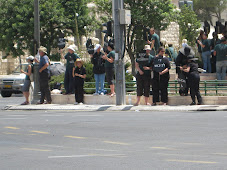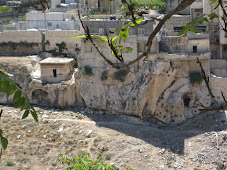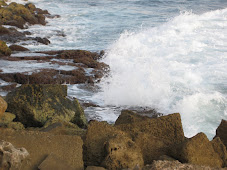Tuesday, July 10, 2007
And She's Down For the Count
P!nk Video -- Dear Mr. President
http://www.youtube.com/watch?v=ugH5MUNNL0c
Monday, July 9, 2007
Rachel Already Makes the Jerusalem Post, and It Had Only Been One Week
Setting the record straight on gays
| ADINA COHEN, THE JERUSALEM POST | Jun. 28, 2007 |
They snuck through barricades, they were strip-searched by the police and they were nearly arrested more than once. No, this is not a description of terrorists in an airport.
When Hebrew University students Isaac and Shlomo wanted to demonstrate their solidarity with the Jerusalem parade in 2006, police prevented them from entering parade grounds. Their crime? Wearing kippot.
"Because we're religious, the police assumed we were there to attack," Isaac explains. "We were there to support democracy, to show that as religious Jews we support gay rights, and instead we were treated like criminals."
When the two students, both 25 at the time, first attempted to enter the parade grounds, they were taken aside into a tent and strip-searched by the police. "We agreed because they told us that after we were searched, we could go inside," says Isaac.
Their participation in the parade was not a matter of personal grievance, but of idealism, explains Isaac, saying that he was determined to demonstrate his support of a marginalized community.
When police prevented the two from joining the parade, Isaac says he felt "hurt. I felt betrayed by the system, that they made assumptions about us [religious people] ... that they didn't allow us to support the same people that they were trying to protect."
"This year, I wore a hat to cover my kippa, and they let me in," he adds.
It's no secret that the gay pride parade is made all the more controversial by its setting in Jerusalem, one of the religious centers of the world, as many perceive the parade as an affront to religious intolerance of homosexuality
When asked about the incident, Micky Rosenfeld, spokesman for the Jerusalem Police, told In Jerusalem, "There have been no reports [of strip-searches]... Any physical searches would have been carried out by a private company, not by the police."
Last year's gay pride parade saw heated protests by haredim, which likely affirmed the need for strict security at this year's parade,
On a rooftop on King George Avenue, overlooking one of the major checkpoints during the parade, a group of yeshiva boys danced and sang religious songs at the top of their lungs.
"It's supposed to be a tikkun [correction]," explains Isaac, who is yeshiva-educated. "They [religious protesters] mean for their actions to somehow counteract the parade."
Even as some of their co-religionists danced on rooftops in protest against the parade, Isaac and others joined the parade in support of it.
Hebrew University student Josh Frankel, who was recently granted a rabbinical scholarship by the Wexner Foundation, says his support of the parade as a religious Jew has to do with acknowledging the existence of homosexuality in all sectors of society.
"It's easy for people to dismiss homosexuality as Tel Avivian, as secular and as licentiousness. But it's not, it's reality, and it's everywhere - in the religious world, and in Jerusalem."
The parade is necessary, he explains, because it breaks the conspiracy of silence by which so many religious homosexuals live. "Homosexuality is invisible," he says, noting that many homosexuals, particularly in the religious community, hide their sexual orientation out of shame or fear of public condemnation, and choose, instead, to lead a double life.
"The parade forces a conversation - even if the reactions are negative," Frankel adds. "It's important that people recognize that homosexuality isn't something that exists 'over there' - it's here [too]."
For Debbie Houben, a recent immigrant from Boston, her support of the parade doesn't clash with her religious ideals. "For me it's not contradictory," she says. "I don't see being religious as having to do with going or not going [to the parade]... I separate people and religion.
"We should support Jews regardless [of sexual orientation]. I believe in loving all Jews," she adds.
"If people ask why these gay people need to parade around, I say 'why do I need to parade around with my lulav and etrog?'"
Similarly, Sarah, a Columbia University student visiting Jerusalem at the time of the parade, saw no conflict between her religious beliefs and attending the parade. It was only after visiting her religious brother in the city that Sarah encountered a clash of belief systems.
"He saw my sticker from the parade and was horrified," she says. "Until then it didn't occur to me that it might offend him."
Most of the interviewed attendees agreed that the parade was "tame."
Rachel Joseph Marrah, a married gay woman from Washington, DC, who is studying to be a rabbi at Hebrew Union College, observed that the parade was small and quiet in comparison to the parades in the US capital.
That smallness, however, seemed to her to be a sign of struggle. "It seemed brave to me," she says.
Houben, on the other hand, expressed disappointment in the subdued nature of the parade. "I know that it's Jerusalem but gay pride of any sort is much more flamboyant or loud or naked," she says with a laugh. "There were more straight people than gay people."
Flamboyant or not, Frankel believes that the parade serves an important purpose. "I don't expect every rabbi to say that homosexuality is OK - they should just be made to see that it's a reality," he says. "If nothing else, they should understand the pain and suffering that gay people in the religious community are experiencing, the struggles that they face."
But for many, that understanding might be a long time in coming.
When asked why he chose to remain anonymous for this article, Isaac says: "Last year when the parade came up in my parents' home, my father was very upset by it. While I support the cause I don't have to... fight the battle in my household.
I don't feel it's worth the family tension."
Still, he adds, "I don't think there should be tension; the first tenet of being religious is how we treat other people."
This article can also be read at http://www.jpost.com/servlet/Satellite?cid=1182951037085&pagename=JPost%2FJPArticle%2FShowFull
Copyright 1995-2007 The Jerusalem Post - http://www.jpost.com/






.jpg)



